
Vol. 1, No. 28 Published by India China Division, Air Transport Command July 26, 1945
|
Chinese Recapture 3 Towns; Fight into Rear of Japanese In Action on 'Invasion Coast' Almost Encircled by Chinese Columns Chungking - Chinese troops have recaptured three rubbled towns guarding Kweilin, tightening their stranglehold on the big airbase city, while a Chinese column approached another former U.S. 14th Air Force airfield at nearby Yangso, the Chinese High Command announced, according to an Army News Service dispatch. Along China's "Invasion Coast" west of Formosa, Chinese ill-armed warriors fought into the rear of Japanese battling toward Swatow and apparently broke up an enemy attempt to establish a coastal beachhead between Swatow and Amoy. These successes came as recent visits to Chungking of American and British officers indicated the discussions were underway regarding plans to co-ordinate China's role in the war with coming Allied blows against Japan. The day before Japanese troops had completed a 45-mile breakthrough on the "invasion coast," but Chinese have retaken the big Han River port of Chaoan, 40 miles from Swatow on the coast. Enemy forces had covered 103 miles in 22 days in a drive apparently intended to seal the southeast coast against possible Allied landings. The former 14th Air Force base at Kweilin is almost encircled. The base, in Kwangsi province, 360 miles southeast of Chungking was occupied by the Japs last year. Headquarters said six Chinese columns are converging on the city, from ten to 30 miles away. Meanwhile, after being stymied for two days by typhoons which lashed the Pacific in the vicinity of Manila, the aerial offensive was resumed when 2,000 American warplanes from carriers and a half-dozen land bases hammered Japan with concentrated fury, according to ANS. |
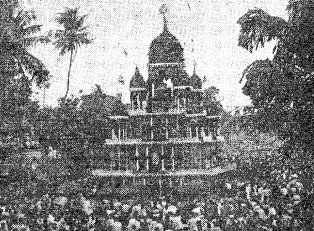 This is the car representing the holy temple of Jagannath ("the Lord of the Universe"). Each year it is pulled
from its place for use in Hindu festivities. Thousands and thousands of devout Hundus gather to witness the ceremonies
and become cloaked in the garb of hysteria which is prevalent at the ritual.
This is the car representing the holy temple of Jagannath ("the Lord of the Universe"). Each year it is pulled
from its place for use in Hindu festivities. Thousands and thousands of devout Hundus gather to witness the ceremonies
and become cloaked in the garb of hysteria which is prevalent at the ritual.
|
Hindu 'Jagannath' Festival
Scene of Intense Passions
By Lt. Rus Walton
Calcutta - Hindus call it "Jagannath." GIs, in their slang, say "juggernaut."
On the afternoon of July 11, and again on July 19, Rishra Road, which runs along the Hooghly River about 15 miles north of Calcutta, was jam-packed. Was it humanity of was it a mass of bobbing, human heads, suspended in humid air? It was virtually impossible to see any part of the bodies, from the neck down.
Mobs swayed in one direction, then another. In between times the over-crowding, sweaty "sardined" people bulged against buildings harder than before.
Pins in Map
Occasionally from somewhere in the midst, came the growing murmur of shouts. They grew closer with groups of eight or ten young men that bullied, pushed and squirmed their way through people. Pushing old men and women, toppling youngsters angrily, darting through slight openings, they hurried about their divine mission of hauling divine water for the divine priests that sat watching the crazed people do crazy things.
Here and there the street surface was smeared with red blood and the redder juice of betel nut. Men carried stretchers over their heads, darting back and forth with injured. Bright red turbans of Bengal police were like pins in a living map.
High in Cupola
Down the street came a huge, gaily painted temple that moved on heavy iron wheels. It was pulled by almost a thousand loin-clothed men who tugged at three great hawsers.
Towering 30 to 40 feet, the car - built like a temple - was mounted on a movable platform. In past years when men and women became inspired to a point approaching insanity, they would often throw themselves under these wheels. That was stopped by the Government and today the commotion is limited to rites of a more spiritual nature.
High in the top cupola sat the idol, decked in cloth, gold-gilded and staring. While the younger, more radical, worked themselves into a froth of jubilation, the older, more composed, clasped their hands in front of their breasts and muttered religious chants.
Most of the religious fervor in this festival, which originated 5,000 years ago, is displayed around the large hawsers that are used to pull the car. Here the devotees fume and fight over the right to pull the rope, tearing the six inch rope to shreds with their hands in an effort to snatch a piece of the holy strands.
This is the Hindu observance of the Rath Jatra festival of Lord Jagannah ("the pleasure trip of the Lord of the Universe'). It is held every year on the second day of the full moon of the third Bengali month, and repeated eight days later.
Believing that the Lord of the Universe manifested himself in human form as a mortal named "Krishna" the Hindus in their rituals follow a legend which tells of a pleasure trip once made by Krishna. At that time thousands pulled his chariot, and today thousands pull a replica of that chariot in commemoration of his famous trip.
U.S. Forces Once More In Nanning
Coolies and Technicians Rebuilding Airfield From Shambles
Nanning, China - The Japs have been gone for some time now.
They left little when they went but American technicians and Chinese coolies have worked steadily for long hours to rebuild an airfield from the shambles.
Now, the base has some activity. After the enemy was cleared out and things were straightened up it is just like any other airbase, except that there is evidence of the destruction once wrought here.
Strip Destroyed
Chinese soldiers live in makeshift tents and in buildings Japs attempted to burn. Tarpaulins slung over charred rafters and walls keep out the almost daily rains.
Bomb craters are visible on what was once a dirt runway and the concrete strip was systematically and completely destroyed when the 14th Air Force left last fall. The planes temporarily land on a taxi strip. When the gear hits the ground mud spatters against the fuselage and tail surface.
Crashes
Pilots can't help but "sweat" the landings on the short strip. The tail wheel skids precariously and occasionally a plane veers off the soupy lane into the ditch on one side or the tall grass on the other.
One plane skidded off the runway and plowed through two tents. Another ship bounced over a ditch and came to rest in a bomb crater. It stopped sinking when the fuselage settled on a bomb - a dud - that had been dropped into the crater.
No one can be blamed for these crashes; they are unavoidable. Often the field has to be closed because the strip is too muddy. The number of planes allowed to land is limited.
Tough Flying
The handful of Americans here work from early morning until dark. Planes do not fly to or from here after dark because of the lack of lighting facilities. GIs plow through sticky, yellow mud each morning to their jobs on the line which begin usually at sunrise.
With hard work and the help of increasing numbers of coolies, progress is being made. GIs and officers live huddled in a small tent area at the end of the taxi strip hidden in the jungle foliage. Planes soar over their tents with not more than a ten-foot clearance, and the noise is terrific. Now and then one comes in especially low and the quarters are hastily abandoned.
Flying into Nanning is among the toughest assignments ever handed to pilots. Since there are no homing beacons or other instrument facilities, ships often in the words of the pilots "must taxi up the river until they find the strip." Often a plane must stay aloft waiting for the strip to be opened when the ceiling lifts to anything above zero.
Each plane that skids to a stop is met by a host of Chinese. Some are just curious to see what the ships bringing. Others, more mercenary, bring their wares to the cargo door. They do a heavy business with their watermelons, mangos, bananas and other fresh fruits.
The Japs have been gone six weeks. But for the razed buildings and occasional bomb craters it might have been a year ago. No enemy planes have molested the field since its recapture. Chinese are coming in from the hills to sell the goods they had cached away or offer their services as coolies.
Next to the runway old ladies coax bullocks around the rice paddies. Slowly, but definitely, Nanning is coming back to life.
And even more evident here than in other parts of China is the lusty "Ding hao" - everything is coming along fine.
Time Not Ripe Yet
Hq., Calcutta - Among letters to COs of all ICD units, one - which got as far as China wing headquarters - was addressed to a new base which has been given a number but which has not been taken over by ATC.
A China wing endorsement read:
"In view of the fact that... is still occupied by the Japanese Imperial Army, delivery of this letter is deemed inadvisable."
Phone Lines To Kweiyang
Headquarters in Kunming Connected With Front
Kunming, China - The first link in communications lines to connect headquarters with troops at the front was completed last week with opening of telephone service between Kunming and Kweiyang.
An SOS signal heavy construction company, commanded by Maj. Edmund B. Johnson, Newburgh, N.Y., put the finishing touches on the circuit.
Actual phone and telegraph service began after two days of alignment of terminal equipment and test calls which followed the hook-up of the last wire.
Lt. Col. John S. Clark, El Paso, Tex., area signal officer, said the line would be used to expedite movement of supplies to the China fighting front. Poles are going up beyond Kweiyang, according to Maj. Johnson, who predicted the terminus of the line would be Tokyo.
Anniversary of USAAF To Be Observed Aug. 1
On August 1, 1907, a division of aeronautics of the Signal Corps was created "to study the flying machine and the possibility of adapting it to military purposes."
At its inception this branch had "new fangled ideas, high-blown fancies, nothing tangible or promising," three men an no aircraft.
Now, 38 years later, the USAAF is as vast as the air which is its heritage. More than two million men wear the insignia of the air forces; they fly, repair, maintain, fuel and supply hundreds of thousands of planes in every part of the world.
668 Planes
In an announcement by Gen. H. H. Arnold, CG, AAF, August 1 has been named Army Air Forces day, to mark the 38th anniversary of the organization.
At the close of the First World War there were 668 American-made planes in existence. Today there are thousands upon thousands of U.S.-built aircraft, ranging from trainers and transports to fighters and bombers, being flown by every one of the United Nations.
Air power has taken on a new meaning through the rapid advancement of aviation during the war. Theories such as destroying cities by air, using aircraft as long-range artillery, supplying armies solely by air transport, moving armies by air, high-altitude bombing, have been developed and proved through recent years of battle-scarred days.
Constant Battle
Nine out of every ten men in the AAF have joined since 1941. At the time of Pearl Harbor's debacle, there were 69 airfields in use. Fifty months later there were more than 1,400 fields being used against the enemy. They were spread all over the world, built under the most difficult and "impossible" conditions.
In growing, the AAF has had to develop many new units which were necessary to its operations. These commands and services include aviation medicine, weather service, airways communication systems, materiel commands, troop carrier and air transport commands, air service commands, aviation engineers and many other specialized branches which have been knit into one solid, hard-hitting force . . . the Army Air Force.
Blazes New Trail From Kunming to Other China Base
1338 BU, China - T/Sgt. Alexander Polgar, Newark, N.J., has blazed a new (but not exactly non-stop) trail from Kunming to this base.
It is doubtful, however, if the route will be adopted as official, because his trip took him just about 3,000 miles out of the way.
Owing to an error by a ticketing agent in Kunming, the sergeant took more than three weeks to make the trip which should have taken only an hour or so. When he handed his orders, transferring him from Kunming to this base, to the ticket agent, the latter stamped "Karachi" as the final destination.
He asked one of the clerks in the office, "Is that where 1338 BU is?" The "I guess so" reply satisfied him. He got on the plane and the next thing he knew he was on the west side of the Hump at Chabua. That bas had no authority to send him back to China and packed him off to Karachi as the ticket indicated.
After the red tape was unsnarled Polgar had to sweat out transportation back across India to the Valley and over the Hump to 1338.
Mr. Howard Moore Requested to Join U.S. Armed Forces
1346 BU, Tezgaon, India - According to a letter from the Army, mailed from Dallas, Tex., F/O Howard F. Moore, Canton, Ohio, had better report for induction pretty soon, or else.
The only catch in the matter is that Moore has been flying military aircraft for more than two years. He flew for 19 months as a primary school instructor and the remainder of the two years he has been flying for ATC in the Ferrying Division and ICD.
The letter requested that he report for active duty in an enlisted status and directed that he send an address "to which travel orders can be mailed and from which you will report for induction." He sent them his present address, "Tezgaon, India."
Now he's flying the Hump sweating out his orders for induction. "It's one way of getting home, if it works," he says.
|
Gurkhas, Sikhs, Pathans,
Hindus, Are 1304th Cops
1304 BU, Barrackpore, India - This base is patrolled by one of the most unusual police forces in India, or anywhere in the AAF - an aggregation of 259 Gurkhas, Sikhs, Pathans and Hindus picked from pensioned policemen, seasoned and decorated soldiers, and retired army officers with commendable records.
Barrackpore's civilian police department began late in February this year in the imagination of S/Sgt. Kermit V. Miller, Williamsport, Pa., provost sergeant of 1304. Sgt. Miller, formerly of the Marines, took Barrackpore's police problems to the CO, Lt. Col. Charles McGarrigle, and aid was sought from Mr. R. Banerjee, CID, Bengal police.
15 Years in India
From the valleys of Nepal, from Kashmir, from the Northwest provinces, and from the Punjab came recruits, as word spread that a super-efficient police detachment was being formed. Sgt. William K. Withcomb, 15 years in India, had the key job of selecting personnel.
Four "commanding officers" were selected to head the four companies of the recruits: S/Sgt. Leonard J. Ludwigson, of Madison, Wis., CO of Gurkha company A; Cpl. Weldon A. Roberts, of Hattiesburg, Miss., of Pathan company B; Pfc. Curtis C. Minor, Murfreesboro, Ark., of Sikh company C; and Pfc. Bryant A. Cunningham, of Wichita Falls, Tex., of Hindu company D.
Each CO knows the religions and customs of the men in his company and he can praise them or dress them down in their own tongue. He sees that they are clean, comfortable and healthy, and in turn he is respected. Sgt. Miller, battalion commander, supervises the four COs under the direction of Capt. Norbert O. Berner, 1304 provost marshal, and the department's "commanding general."
College-Educated
The men were drilled by their GI leaders under regulations closely resembling the U.S. Army set-up, even including the 11 general orders. Such details as the morning report and the sick book are not forgotten. Personnel wear the outfit's own distinctive uniform.
The Indian officers thus far appointed within each company have had a college education as a prime requirement.
Though interested in the good pay, many of these men were not attracted by the title "chief constable" which was originally given to their ATCCP commission, and research showed that in their view it lacked sufficient prestige. So it was changed to "assistant sub-inspector," which, paradoxically enough, drew them in. Today there are 15 leaders bearing that title.
Since ATCCP's formation, the record of petty thievery and other violations of discipline on the base has decreased steadily, until, in the past month, not a single theft of government property has been reported, and day after day the report goes in, "Report of Incidence - Nil."
Club Commando Can Fool Some People But Not with H2O
1330 BU, Jorhat, Assam - Neatest tale of "tables turned" is now making the rounds of the Red Cross canteen here, to the discomfiture of one RC commando who's pulling his practical jokes elsewhere.
The GI strode to the coffee bar the other evening and said to the civilian waiter, "Give me 50 CCs of H2O." Obviously surprised, the waiter said, "Yes, Sahib," and started for the kitchen, whereupon the local prankster proceeded to let his buddies in on the trick and sat down to await the results.
Five minutes later the waiter returned, and, handing a cup to the smiling GI, said:
"I'm sorry, Sahib, but we have no accurate measure in CCs. Inasmuch as a common measuring cup has a volume capacity of approximately 200 CCs. I was able to reduce it mathematically in terms of pints and measure the H2O within three CCs either way. If it doesn't meet with your approval, perhaps I could get you 50 CCs of H2SO4."
The embarrassed GI gulped his water and beat a hasty retreat through the crowd of snickering onlookers, stopping only to ask what H2SO4 was. "Sulphuric acid," was the answer.
Seems the waiter is a student at Calcutta University.
Planes Carry Truck Engines for Convoy to Keep Road Clear
Advance Section, ATC - To keep convoys rolling along the Stilwell Road this section has begun to handle rebuilt truck engines which are flown from a plant in Calcutta.
When the "vehicles disabled for parts" figure began to climb an appeal was made to ATC to supplement the transportation of engines to and from the Calcutta plant. Previously all engines had gone by rail and as many as 1,000 engines were in transit at one time. This meant that many trucks were tied up waiting for engines.
Although the majority of engines still go by rail, ATC is hauling a sufficient number to keep the trucks rolling. Because of more careful handling, the engines arrive in better condition than those that come by rail and can be installed immediately in any truck that is tied up waiting for parts.
P&T Wallah Helps to Pull Big 3 Deal
Unloads Planes of Paper for use at Yalta Conference
1338 BU, China - While he may not go down in history as one of the men who laid the foundation for the United Nations organization, Pfc. Henry Voltaggio, now assigned to this base, did take part.
He was a P&T man on TDY helping to take the British and American delegations to the Big Three meeting at Yalta - one of the preliminary conferences before San Francisco.
Plenty of Equipment
From his North African ATC base at Oran, Pfc. Voltaggio traveled on secret orders to Casablanca where he learned he would be working for the men going to Yalta.
"There were C-54s and C-47s used in carrying the diplomats, military advisors and their equipment," Voltaggio said, adding: "I was so busy I didn't count the planes exactly.
"There was plenty of equipment. The delegates carried their own food and cooking utensils. You might not believe it but I unloaded six planes that had almost nothing but crates of documents. We had to work in ODs and be clean shaven each morning."
At Malta another P&T man took over for the rest of the journey to Yalta. After his work was finished Pfc. Voltaggio and his crew got a week off and traveled all over the island in a jeep.
No Letters
This was the most bombed spot in the world, he said, but pointed out the rubble was all piled neatly and the people were very cheerful. He added:
"The Maltese are a distinct people. I can understand French, Spanish and Italian but I didn't malum more than a couple of words of their language."
For the whole month that he was away from his base he was not allowed to write to his wife. She sent two radiograms inquiring about him but was relieved of worry when she saw him in a newsreel standing near Gen. Marshall.
For his efforts Voltaggio received personal letters of commendation from Gen. Marshall, Lt. Gen. George and Brig. Gen. Stowell.
Lucky Guy Will Make U.S. Junket
Man That Picks Best Title For ATC Eleven To See Game
Hq., Calcutta - Hot dogs? Pretty gals? Big stadium? Good football game? Little fun on the side? Trip home? See Uncle Sugar in the fall? Boy, oh boy!
Here's a chance for some lucky guy to do all that. It's not rotation, not redeployment, not temporary duty. Just select a name for ATC's national football team and if it's the winner, pack that bag!
Washington has announced this week that ATC is sponsoring a national football team but so far has not decided on a name for the high-flying eleven. The squad will be made up of men assigned to its world-wide command. The team's program for this fall will schedule it against the major service teams in the U.S.
All personnel throughout the ten divisions in ATC, regardless of where stationed, is eligible to submit names for the gridiron eleven. The winner will be given the opportunity to attend any ATC football game during the coming season. Those games will be played in the U.S.
Leave, transportation and other details for the winner will be handled by proper authorities, based on the game he chooses to attend.
All entries must be submitted immediately to the base COs who will relay them to ICD headquarters to be relayed at once to Washington for the final decision.
Deadline for the contest is July 31.
|
This may be the dregs of the vodka bottle or it may be the truth. Decide for yourself. But if you don't believe it, ask the old-timers.
One evening, along about sunset, two pilots were walking along the flight line at Kunming. They were talking about this and that. Suddenly one turned to the other.
"Say, isn't that a Jap Zero parked there on the flight line?"
"Naw," said t'other.
"Sure it is. Take another look." Sure enough, it was a Jap Zero, sitting there on the flight line. It had no insigne. As the two pilots watched, the canopy slid back and a head popped out. After loosening the safety belt and unfastening the parachute harness, a guy nonchalantly stepped out onto the wing.
"Hey," said one of the Hump-happy heroes, "isn't that a Jap Zero?"
"Yes, gentlemen, it is," said the pilot with a broad smile.
"Been up flying her, have ya?"
"Yes, I've had her up for a spin."
"Testing her out for intelligence, huh? How does she fly?"
"Oh, she's a pretty nice ship."
"Ever fly a '51? How does she compare with a '51?"
"I've never had the pleasure of flying a '51."
"How about a '40?"
"Yes, I've flown a '40. This ship is better than a '40."
"Well, from what you've seen of a '51, how do you think they compare?"
"The '51 has more firepower. I guess they're even-steven."
"We're transport pilots in ATC. Going over to have a cup of java, how about coming along?"
"I'd be delighted. Do you think I could get a little more gas?" The gas truck was notified and the boys went off to the line mess.
"How long are you men here for? When do you think you'll go home?" the Zero-boy asked.
"Hell, this rotation deal is all mixed up. We'll probably be here for the duration plus. How long have you been away from your folks? You're lucky, you're in your own country."
"Yes, that is true, but it has been quite a while since I have seen my people."
"Where's your home?"
"It's quite a way east of here."
"Kind of hard to get back there now, isn't it?"
"Yes, it is. But some day I'll go back." They talked on and finally walked back to the fighter plane. As the pea-shooter pilot climbed into the ship he said goodbye and waved his hand. He started the engine, taxied out and took off. The truck drivers watched him go.
"Going up to wring her out some more, I guess. Huh?"
"Yeah, guess so. Boy I'd like to fly that baby." The boys walked back towards operations.
Several days later the cargo-kids were talking to a friend of theirs, a Chinese pilot stationed at Kunming.
WOW . . .
"Say, where's that Zero that you boys have been flying around the last few days?"
"You must be all wet. There's no Zero around this field."
"But how about that plane that we . . . "
"Yeah! Don't kid us. We had a cup of coffee with the pilot."
"Brother, either you guys are nuts or you actually saw a . . . "
"Aw, hell, that couldn't be . . . do ya really think? Gosh!"
"A Jap? Oh migosh!"
"Wow!"
Which goes to show you that it's pretty hard to tell a stinking Jap from a good Chinese. Or maybe it goes to show you what happens when you tip the vodka bottle too much and too often.
|
Loads Ships in Less Time
1345 BU, Kurmitola, India - A conveyor assembly for loading aircraft has been put into operation at this base, replacing the fork-lift and cutting loading time for a C-54 to five minutes.
The conveyor will handle all types of cargo, from gasoline drums to 500-pound bombs. Only one man is required to operate it. It loads three aircraft while a fork-lift loads one. It also cuts down accident possibilities since it saves extra handling of cargo.
The conveyor is towed to the side of the plane where a hinged end rests on the floor of the aircraft. The other end rests on a truck carrying the load. From the truck the cargo is rolled onto the conveyor, goes into the plane and is carried along floor conveyors to the tying-down location.
T/Sgt. Eugene W. Gingerich, Mt. Wolf, Pa., and Cpl. Edgar H. Schultz, Mondovi, Wis., got the idea that a chain-type of conveyor would speed loading time. They convinced priorities and traffic that such a loader could be made to work.
Officials in Calcutta said no. But with the help of the Air Service Command and other contributors the conveyor was constructed after about four months of planning and modifications. Plans are now underway for construction of more of its type.
Writer Claims West Finds Orient Origin of Culture
Many Problems Besetting Modern World Were Met and Solved by India Centuries Ago
(Ed. - This is another in a series of articles on India by Prof. Vaswani. Views expressed are those of the writer and do not necessarily reflect the opinion of the ICD or the Hump Express.)
By Prof. B. J. Vaswani
"These (religious speculations of India) have been the cradle of all western speculations, and wherever the European has risen to heights of philosophy, it has done so because the Brahmin was the pioneer.
"There is no intellectual problem in the West which has not its earlier discussion in the East, and there is no modern solution of that problem which will not be found anticipated in the East."
That is the considered conclusion of Dr. Morgan, a western scholar of Indian cultures, and he is not a solitary witness to the conception of India as a source of world civilization.
Pay Tribute
More and more western scholars are beginning to see more clearly what unredeemable debt the world owes to the much-maligned Hindus and Hindustan.
"In the whole world there is no study so beneficial and so elevating as the Upanishads (Indian philosophical literature of pre-Christian era). It has been the solace of my life, it will be the solace of my death."
Thus wrote Schopenhauer, the great German sage, and a similar tribute has been paid to the sublimity of Indian speculation by Emerson, Longfellow and many other distinguished American and British modern poets and philosophers.
"India is a source from which not only the rest of Asia, but the whole of the western world derived their knowledge and religion."
This was the verdict of Prof. Hearen in his "Historical Researches."
A great deal of modern European culture traces its origin to ancient Greece, and a great researcher in India-Greek civilization has given it as his studied opinion that in the heyday of Greek literature and philosophy, "Greece and Egypt were the colonies of India" (intellectually and spiritually).
A Pioneer
I already have shown how music of the world which had its origin in India, traveled to Persia and Greece, and from there to all the countries of the West, and Indian music as formulated by Indian poet-seers several centuries before Christ, is still the basis of modern European systems. Similarly, researches have shown that even in science, industry and fine arts India was the pioneer in human civilization.
To give only one instance, it was in the 18th century that Sir William Jones, a brilliant Persian-Arabic scholar, came upon a discovery which opened to the amazed scholars of Egypt the vast and hitherto unsuspected world of Indian fine literature. He had been collecting codes of Hindu laws when he was told that there existed in ancient Sanskrit a large number of dramas.
This astounding statement stimulated his zest for discovery, and he obtained a copy of "The Ring of Shakuntola," a revelation of beauty and high art which has been translated into nearly all the European languages. As piece after piece came to light, the Hindu drama was found to have astonishing affinities with the ancient Greek drama.
Allegory
All these dramas were in verse. There are prologues and epilogues, addresses to the audience, allegorical characters and what is exactly the Greek chorus.
General treatment of the subject, the working of the plot, the development of characters, the sequence of events, down to details, very strongly reminded the literary and scholarly world of the West of Greek drama and Shakespearean drama. Later researches have shown that the Greeks had derived their dramatic art from ancient India, and that Egypt got it secondhand from Greece.
It is not only in drama that the literature of the world is indebted to India. Most of the fairy tales of European nations, most of the moral tales of the world, most of the "animal stories" in world literature have now been traced to India. Many of these stories came originally from Panchatantra, the book of Indian fables. "Aesop's Fables" and the stories of Grimm and Anderson have also similarly been traced to India, and recently Russians have discovered that their ancient tales, Steffaneet and Thneolat, or Bariaham and Josephato were taken from the old Hindu Panchatantra and Hitopadesha, and the Buddhist Jataka.
Japs Have Big Army Despite Heavy Loss
Washington (ANS) - Generalissimo Chiang Kai-shek recently reported 1,203,067 Japanese either killed or captured in eight years of fighting in China.
American and British forces have killed or taken prisoner some 1,500,000 Japs to clear the way for what Admiral Nimitz calls the "pre-invasion stage." It is estimated that 600,000 others have been cut-off or bypassed on Pacific islands.
Officials estimate that the Japs still have five to ten million men, including the cream of the crop for defense of the empire.
Rhythm Rangers Find Grand Audience at Loneliest ICD Base
1359 BU, China - What was scheduled to be a one-hour show stretched to two and a half hours when the Rhythm Rangers, first ATC show to hit this base, opened its bag of corn.
With no movies, dayrooms or other recreational facilities available as yet, show-hungry GIs brought back the troupers time and again to do their western songs and skits.
Lt. Russell S. Jackson, flight operations officer, joined the boys and added his mellow clarinet to the strings of the "westerners."
To stage the performance it was necessary to build platforms and improvise a public address system.
|
Built by 4 Men and Dummy
1345 BU, Kurmitola, India - The "tent of tomorrow" that can be moved anytime, anywhere, with or without reason, has been invented by four men and a dummy at this base.
Experiencing the roughness of the war-time housing situation in India, this band of enterprising GIs decided to make sure they have at all times, a roof over their heads. Now, when the weather acts up, the CO rearranges the housing plan, or rents get too high, they can move their Handy-Dandy Weatherproof, Leakproof, Warp-proof, Wind-proof Home Shelter (one each) to a new and better location.
That is, they can move if 11 other guys will help. It takes 15 strong-armed workers (and a dummy) to carry the tent to its new locations. Sometimes the bearers are talked into lending a helping hand.
The domicile is inhabited by M/Sgt. D. R. Fisher, Lafayette, Ind.; S/Sgt. Pete Badrich and Sub-Pvt. Oscar O'Connor (the dummy), both of Hagerstown, Md.; S/Sgt. Sol Sincoff, St. Louis, Mo., and S/Sgt. A. S. Kruger, Amsterdam, N.Y. Next to their complaint that Sub-Pvt. O'Connor refuses to do any work, the men worry most about the fact that someday they will have to leave India. They hate to think of their "Old Soldiers' Home, Mobile" being used for a shanty in the middle of some desolate rice paddy.
Fried Frogs' Legs Become Specialty Snack at 1305th
1305 BU, Dum Dum, India - Frog legs, fried, with or without chips, over easy and done to a crisp brown, are now an occasional specialty on the snack menu at this base.
T.Sgt. John J. Turk, who takes credit for being the frog-fetcher, has caught more than 143 frogs to date, averaging about one pound each. His forays into the wilds of the local rice paddies to procure the delicacies has met with high approval from the chowhounds around here.
When asked if he used the old "red flannel" method for catching the croakers, Sgt. Turk replied, "Hell, no. These Indian frogs are so dumb you can walk up behind 'em and use a club."
As a result of Turk's expeditions the ponds and drainage ditches are now almost void of frogs. This not only promotes good eating but also good sleeping since the croaking frogs used to stir up quite a racket during the night.
Bombay Has Correct Men At Its Hotel
Bell Was Top Manager; Evans, Proprietor of Eatery
1308 BU, Bombay - The Army classification system hit the bell when it assigned two GIs to this rest camp. The men are Pfc. Edwin Bell, Dallas, Tex., and Sgt. Herman Evans, Graham, Tex.
Both are now working at ICD's newest rest camp in Bombay - Bell as room clerk and Evans as head cook.
Started BOQ
For two years prior to his induction into the Army Bell was the manager of the White Plaza hotel, Dallas. Before that he had many other hotel jobs, serving as assistant manager of the Del Norte, El Paso, Tex., the Franciscan, Albuquerque, N.M., and the Ambassador, Washington, D.C.
Entering the Army he was given the job of starting and developing the BOQ at Love Field, Dallas, Tex.
Mobile Messer
Sgt. Evans, prior to his entering the armed service, managed a restaurant in his home town for five years.
Overseas, his first duty was with a mobile mess training unit which toured the I-B and C inspecting and making surveys of the messing facilities. Now he's at Bombay, in charge of the kitchen and baking the pastry.
|
Chestful of Medals,
400 Combat Hours,
Sgt. Still 'Sweating'
1305 BU, Dum Dum, India - T/Sgt. Daniel Kraus, of Brooklyn, is curious about this rotation program he's been hearing so much about. With 15 Air Medals, the Distinguished Flying Cross, 400 combat hours over France, Belgium and Holland, approximately 250 ICD hours and 141 "points," he's still at 1305 sweating out his next trip over the Hump.
In May, 1943, Kraus left Uncle Sugar and headed for Scotland. Then he was stationed in Essex, England, until a transfer sent him to Calcutta. After completing 74 missions as radio-gunner on a B-26, he was sent to this base as radio operator. On top of that, his crew was forced to make many a crash-landing before the home base was reached.
But - Sgt. Kraus is still not on the homeward-bound list!
GI Has Great Need For Corona Weed, Gets Major's Rope
1323 BU, Misamari, Assam - There's nothing some men won't do to get a smoke when they run out of the filthy weeds and feel that craving creeping up on them.
Take Sgt. Tony Cinico, Philadelphia, Pa. When he wants a cigar, he really wants a cigar, but bad. Last week when the PX at this base ran out of Havanas and La Coraonas, Cinico was going crazy when he remembered that there was a certain major on the base who also like cigars. Being a more practical man than Cinico, the major keeps an inexhaustible supply on hand.
Cinico made a decision. The major was his man.
When he arrived at the major's basha, he found the major entertaining a couple of brass-hat colonels. Heedless of the consequences, Cinico rapped on the major's door, walked in, strode past the brass, saluted smartly and explained his predicament.
The major came through with the weeds; Cinico came through with profuse thanks, and the brass came through with some oddly assorted stares.
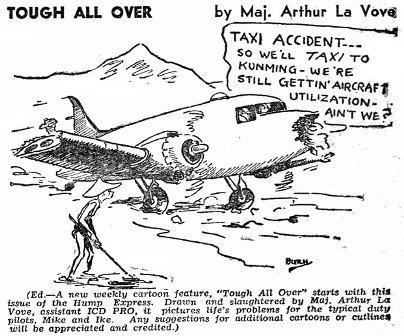

Rest in China
Oliver Wendell Holmes wrote, "War is organized boredom." Sometimes in China it isn't even organized.
For quite a while the men of ICD stationed on the far side of the Hump have been working and wondering when they would get the chance to go to rest camp. It has been a long time. There is a reason for their waiting.
In all China there is only one rest camp for all the United States forces assigned to that theater. One rest camp for all the officers and enlisted men from the various components such as ATC, AAF, ASC, 14th AF, USCCC and the many other smaller but essential groups.
Military security does not permit publication of the number of men who depend on this one rest camp for a period of relaxation, but at the present rate of expectancy, it will be a long, long time before every man in that theater gets to go.
This single rest camp can accommodate 500 men at one time. In the not too distant past there was a time when it could accommodate only 175 men. And now even at the increased rate men will not get to go to rest camps when they are eligible.
ICD officials realize that the pace that kills is not always the race against death or time. For the men in China the pace that kills is the race against boredom - a fight against time that staggers along on stagnant hours, loathsome days and lonesome nights.
To give these men a chance to get away from these torturous, never-ending days, the division has been trying to get authorities to allow establishment of a rest camp in China for ICD men. It was impossible for several reasons, primarily because of the shortage of supplies and equipment which would be required to set up the new camp site.
The campaign was waged time and time again to establish a rest camp -
|
Ding and How by Pvt. John Babnis, 1342 BU 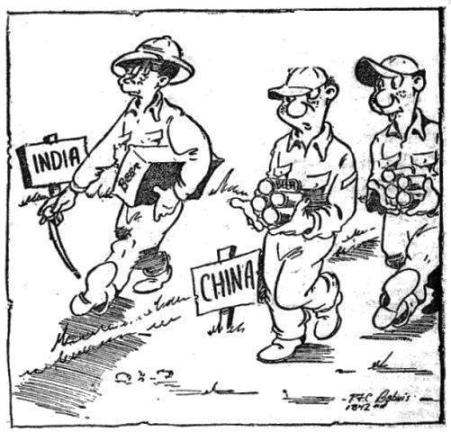 "I'd say India has its points!"
"I'd say India has its points!"
|
At the present time representatives, armed with authority from ICD headquarters, are touring China making a survey of the situation and prospecting for a campsite. Whether it will do any good depends upon decisions made by theater officials in China. The division is whole-heartedly behind the program which sponsors rest camp leaves for men at regular intervals. If there is anything that can be done to promote the deal, it will be done.
We realize that this newspaper is primarily for personnel in ICD, and we realize that in any event what we may have to say will have little influence upon anyone who can stir up action. We want our men to get a good break. We want our men to get rest leaves in China. But we also consider it just as important for every command in China to get a decent break!
Supplies are scarce. We know that the war in China has been slow because of long lines of supply. We realize that. But rest camps don't have to be elaborate establishments where guys can go to brawls and banquets. Let them be quiet places in the hills, near a lake, maybe, where men can relax, recover and comeback refreshed.
Radio, Flight Transition Schools at Gaya Furnish the "Know-How"
To teach fliers the technique of piloting aircraft over the Hump and radio operators how to do their job on those planes, ICD established training schools at 1311 BU, Gaya.
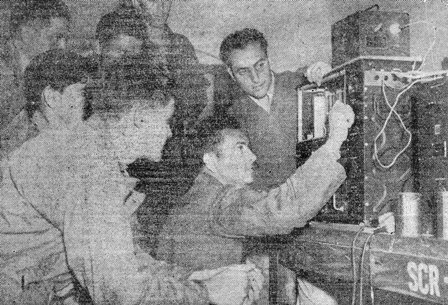 Fledgling R/Os practice tuning a liaison set, under the eye of S/Sgt. John Berenato (wearing sweater), Atlantic City,
N.J., Instructor. Cpl. Art Phillippi, Wenatchee, Wash., is at the controls.
Fledgling R/Os practice tuning a liaison set, under the eye of S/Sgt. John Berenato (wearing sweater), Atlantic City,
N.J., Instructor. Cpl. Art Phillippi, Wenatchee, Wash., is at the controls.
|
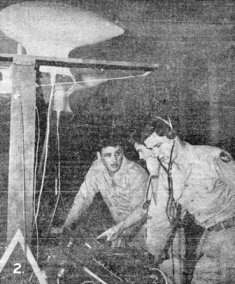 Teaching and learning the operation of the radio compass are (l to r) Pfc. Don W. Lozen, Mt. Clemens, Mich.; Pvt.
Herbert W. Diets, Syracuse, N.Y., and Pfc. Alexander P. Schuck, Sheboygan, Wis.
Teaching and learning the operation of the radio compass are (l to r) Pfc. Don W. Lozen, Mt. Clemens, Mich.; Pvt.
Herbert W. Diets, Syracuse, N.Y., and Pfc. Alexander P. Schuck, Sheboygan, Wis.
|
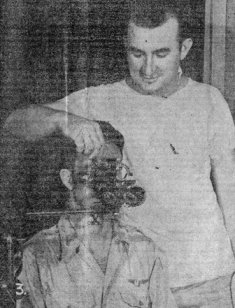 All-important vision is tested by Cpl. Steven Smith, Bayonne, N.J. The patient is F/O Kenneth H. Johns, Imperial, Calif.
All-important vision is tested by Cpl. Steven Smith, Bayonne, N.J. The patient is F/O Kenneth H. Johns, Imperial, Calif.
|
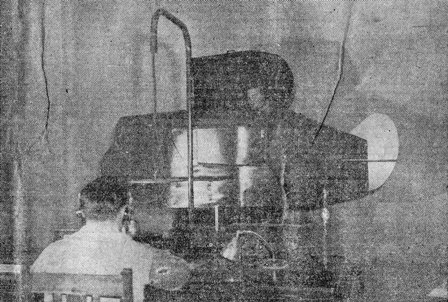 Logging Link trainer time is Capt. Fletcher A. Hatch, Newton, Mass. Checking him is S/Sgt. Howard K. Schalla, Chicago.
Logging Link trainer time is Capt. Fletcher A. Hatch, Newton, Mass. Checking him is S/Sgt. Howard K. Schalla, Chicago.
|
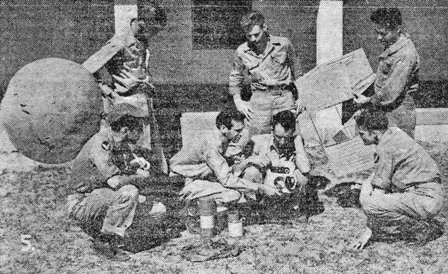 Investigating the innards of an emergency radio set are Sgt. Roy Buchaskian, Detroit; Pf. Leaman C. Cocke, Wanger, Okla.;
S/Sgt. C. Pump, Pittsburgh, instructor; Cpl. Lawrence A. Skelton, Lynn, Mass., and Pfc. Frank Evans, Saugus, Mass.
Investigating the innards of an emergency radio set are Sgt. Roy Buchaskian, Detroit; Pf. Leaman C. Cocke, Wanger, Okla.;
S/Sgt. C. Pump, Pittsburgh, instructor; Cpl. Lawrence A. Skelton, Lynn, Mass., and Pfc. Frank Evans, Saugus, Mass.
|
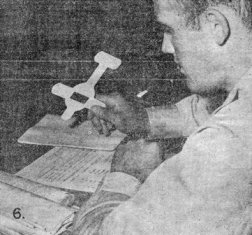 Working over a radio exam is Lt. Gerald R. Bovard, Grove City, Pa.
Working over a radio exam is Lt. Gerald R. Bovard, Grove City, Pa.
|
|
Chinese Girl Improves Ration Deal for GIs at Liuchow
Liuchow, China - When the first few GIs came into Liuchow there wasn't even a stove to be salvaged, much less a mess hall.
K-rations looked lousy after a few days and an engineering captain decided to do something about the food situation.
A young Chinese girl who had been a nurse in Hong Kong before the war volunteered to be mess sergeant. A few mess boys were enlisted and the mess came into being.
Scouts were sent out from among the few GIs there and they soon returned with everything the city had to offer. Duck eggs, peaches and eggplant - that was the limit. Nothing else could be had. It was enough to flavor some sausage and C-rations.
Meals were served family style and everyone who ate there will testify it was some of the best chow in that area of China. One of the boys turned out to be a baker and pastry crept into the menu.
Clara had her worries though. Much of the pastry was filched before mealtime ever rolled around. GI appetites were beyond anything she had calculated. But she kept the mess rolling. Now she wonders if the Americans will show up with a bonafide mess sergeant. If they do, she'll be out of a job.
A-1 Section Busy as Special Assignments
Fall to 1326th GIs
1326 BU, Lalmanir Hat, India - From Memphis to St. Joe is quite a hunk of territory, as the man who wrote the lyric to "Blues in the Night" observed.
It is nothing, however, compared with the 1,500 miles from the burning sands of Khartoum in the Anglo-Egyptian Sudan to the pagodas of Kunming - where 1326 men for the past several weeks have been on temporary duty assignments.
While one group was highballing along the Stilwell Road toward Kunming, as part of the ATC convoy, another contingent was en route to the mid-African ATC base at Khartoum on a communications mission.
Sending relief where needed is a familiar chore to Maj. Merle Coombs and his 1326 personnel section assistants, M/Sgt. Frank Stumpf and S/Sgt. Norman Patterson.
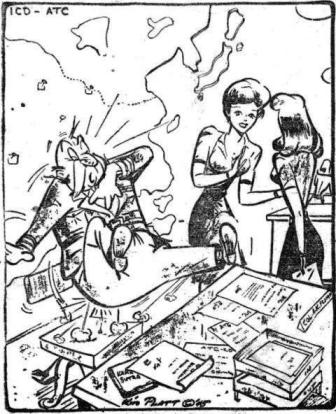 "The colonel just found the farthest advanced ATC base in China."
"The colonel just found the farthest advanced ATC base in China."
|
Reply In Classroom
Unskilled Civilians Learn Methods
of Aircraft Maintenance
1332 BU, Mohanbari, Assam - "Malum pliers?"
"Nay Malum, sahib."
"Malum magneto?"
"Nay Malum, sahib."
"Malum wrench?"
"Nay Malum, sahib."
"Oh, nuts."
"Malum, sahib. Me malum, you nuts. "
That's just about what Capt. Max A. Kline, Huntington, Ind., of the engineering department went through every time he conducted a class. Kline was given the seemingly impossible job of schooling completely unskilled civilian employees in the methods of aircraft maintenance.
The civilians had been assigned to the department as mechanics' helpers and they "nay malumed anything." After a while a plan to teach the helpers was started, but things didn't go too well. Instead of junking the set-up it was tossed to Capt. Kline and Pfc. Gordon M. Rowe, Phillipsburg, N.J., for one last try.
Kline and Rowe had three months in which to make skilled assistant mechanics out of the Indians. They drew up a course which looked good on paper, then held their breath while they tried it out on the students.
Now the school is considered "an unqualified success." In fact, 15 students already have shown outstanding ability and are being placed in a special class for more rapid and more advanced instruction.
Malum mechanical aptitude?
HUMP EXPRESS is the official newspaper of the India-China Division, Air Transport Command, APO 192, c/o Postmaster, New York, N.Y., and is published by its Public Relations office. Camp Newspaper Service and Army Newspaper Service features are used, reproduction of which is prohibited without permission of CNS and ANS, 205 East 42nd St., New York, 17, N.Y. Other material is submitted by staff members, ICD-ATC base Public Relations sections and other soldier correspondents. Printed weekly by the Hindusthan Standard, 3 Burman St., Calcutta, India, and distributed each Thursday. Passed by U.S. Press Censor for mailing.
| Military transport schedules over India for cargo, personnel and mail . . . maximum tonnage of essential war materials over the Hump . . . movement of troops and supplies in support of tactical operations in China . . . evacuation of the sick and wounded - these are the missions of ICD-ATC. |

JULY 26, 1945
Original issue of HUMP EXPRESS shared by CBI veteran Grover P. Fike
Copyright © 2008 Carl Warren Weidenburner
TOP OF PAGE PRINT THIS PAGE ABOUT THIS PAGE E-MAIL YOUR COMMENTS
PREVIOUS ISSUE HUMP EXPRESS BASE NEXT ISSUE
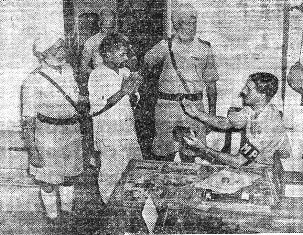 This isn't a gag at an American Legion convention, as the hardware might indicate, but a probing of the honesty
of an Indian bearer. The praying one was brought in by two of 1304's new police force and is getting the heat from
S/Sgt. Kermit V. Miller, "battalion commander."
This isn't a gag at an American Legion convention, as the hardware might indicate, but a probing of the honesty
of an Indian bearer. The praying one was brought in by two of 1304's new police force and is getting the heat from
S/Sgt. Kermit V. Miller, "battalion commander."
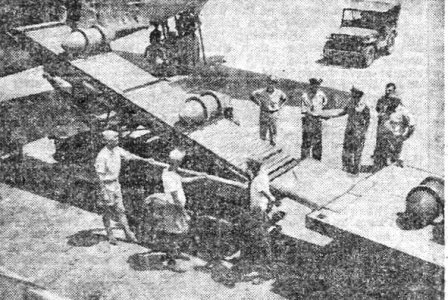
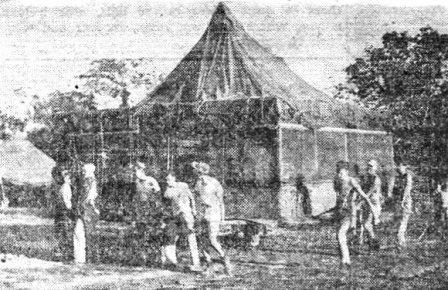 One way to lick the unsatisfactory neighbor problem is to pick up your tent and steal away into the
night. GIs here did the same trick, in the daytime. The mobile dwelling comes in handy, too, when the
old locale gets a bit too soggy from the monsoon rains.
One way to lick the unsatisfactory neighbor problem is to pick up your tent and steal away into the
night. GIs here did the same trick, in the daytime. The mobile dwelling comes in handy, too, when the
old locale gets a bit too soggy from the monsoon rains.
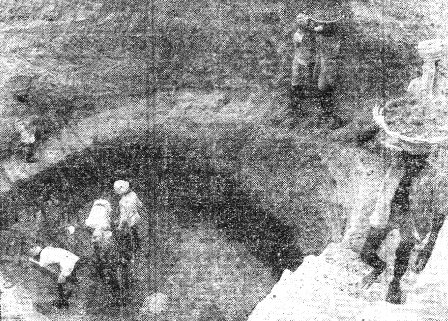 Yeah, it's a deep subject. Indians digging a new well at 1307 BU, New Delhi, carry hundreds of baskets
of dirt up steps carved inside the excavation. It's the slow way, the hard way, to get the job done. But it's
India!
Yeah, it's a deep subject. Indians digging a new well at 1307 BU, New Delhi, carry hundreds of baskets
of dirt up steps carved inside the excavation. It's the slow way, the hard way, to get the job done. But it's
India!
 A "comely colleen" says the press agent's blurb which accompanied this photo of Dublin-born Angela Greene,
appearing in Warner Brothers' new "Rhapsody in Blue." "That ain't the half of it," said the GIs at 1350 BU,
Kunming, who sent in the pic.
A "comely colleen" says the press agent's blurb which accompanied this photo of Dublin-born Angela Greene,
appearing in Warner Brothers' new "Rhapsody in Blue." "That ain't the half of it," said the GIs at 1350 BU,
Kunming, who sent in the pic.